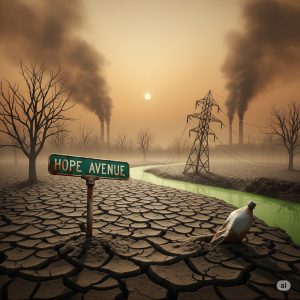
Question #1: What is the climate crisis?
The Climate Crisis: The Earth is becoming increasingly dangerous and inhospitable to human and non-human life. Main culprit: the Earth is heating up.
Negative impacts of a warming planet:[1] (1) Erratic Weather, (2) Melting Ice and Glacier Loss, (3) Sea Level Rise, (4) Agricultural Loss, (5) Loss of Forests, (6) Loss of Biodiversity, (7) Damage to Fisheries, (8) Pollution Challenges.
Question #2: Isn’t this just being alarmist?
A claim about the scientific consensus:
The scientific consensus: (i) the climate of our world is warming, and (ii) this warming is significantly linked to human activities, and (iii) the warming is occurring at a rate that will mean serious consequences for the earth and many who live on it.[2]
- For statements on the scientific consensus, see: https://science.nasa.gov/climate-change/scientific-consensus/
- For the (main evangelical dissenting view), see the Cornwall Alliance, and The Evangelical Declaration on Global Warming: https://cornwallalliance.org/landmark-documents/evangelical-declaration-on-global-warming-2/
Question #3: Is there a biblical basis for creation care?
We ought to care for creation for at least four (biblical) reasons: (i) love of God, (ii) love of neighbor, (iii) God’s command for us to steward/care for all of creation, including the non-human world, and (iv) to be a faithful witness to the world.
Question #4: How can faithfully care for the created world (and love our neighbors well)?
We can faithfully care for the created world (and love our neighbor well) only if we cultivate wisdom. This wisdom will involve us (i) properly understanding and (ii) cherishing creation so that we (iii) can make sound decisions (about the human and non-human world) and (iv) live faithfully within our creaturely limits.
Question #5: How do we practically make sound decisions and live within our limits?
- First, we must rethink our axioms. We ought to reject a posture of choosing-controlling (Mastery Posture) and instead adopt a posture toward the world (and others) of accepting-appreciating (Steward Posture).
Practically speaking, there are two categories for acting:
- Individual actions: talk about climate change, inform yourself and take actions in our own lives.
- Joint actions: become part of the bigger solution by acting in communities (your church, secular groups with common interests, parachurch organizations, civic organizations) and by advocating for government and corporate action. Organizations such as World Relief or the Evangelical Environmental Network (EEN) and the Young Evangelicals for Climate Action initiative.
 [1] Dorothy Boorse, Loving the Least of These (NAE booklet), 2022.
[1] Dorothy Boorse, Loving the Least of These (NAE booklet), 2022.
[2] Moo & Moo, Creation Care, 191.




